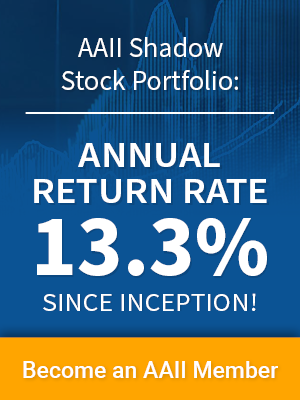Based on key financial metrics such as the price-to-sales ratio, shareholder yield and the price-earnings ratio, the following 3 stocks made the list for top value stocks in the Capital Markets industry. Those looking for value stocks to add to their portfolio may want to use this list as a starting point for further investment research.
Why Focus on Undervalued Capital Markets Stocks?
Value investors seek to buy stocks at a discount to their intrinsic value. Long-term returns show that such strategies are advantageous. Value stocks, as a group, tend to outperform growth stocks over extended periods of time. Typically, value investors perform financial analysis of numerous metrics, don’t follow the herd and are long-term investors.
AAII’s A+ Investor Value Grade is derived from a stock’s Value Score. The Value Score is the percentile rank of the average of the percentile ranks of the price-to-sales ratio, price-earnings ratio, enterprise-value-to-EBITDA (EV/EBITDA) ratio, shareholder yield, price-to-book-value ratio and price-to-free-cash-flow ratio. The score is variable, meaning it can consider all six ratios or, should any of the six ratios not be valid, the remaining ratios that are valid. To be assigned a Value Score, stocks must have a valid (non-null) ratio and corresponding ranking for at least two of the six valuation ratios.
What Goes Into AAII’s Value Grade?
Stock evaluation requires access to huge amounts of data as well as the knowledge and time to sift through it all, make sense of financial ratios, read income statements and analyze recent stock movement. AAII created A+ Investor, a robust data suite that condenses data research in an actionable and customizable way suitable for investors of all knowledge levels, to help investors with that task.
AAII’s proprietary stock grades come with A+ Investor. These offer intuitive A–F grades for more than just value. It is possible for a stock to appear cheap based on one valuation metric but appear expensive on another. It is also possible for one valuation ratio to be associated with outperforming stocks during certain periods of time but not others. Some stocks may even have null values for certain metrics like the price-earnings ratio or the price-to-book ratio but not others. An example of this would be a company with losses instead of profits or a negative book value because of heavy borrowing. Negative earnings or book value result in non-meaningful ratios that are left blank or null.
Click the button below to learn more about A+ Investor and subscribe today.

3 Undervalued Capital Markets Stocks
Of course, there are countless value stocks that are worth mentioning, but this is a concise list of the top 3 undervalued stocks in the Capital Markets industry for Tuesday, November 18, 2025. Let’s take a closer look at their individual scores to see how they measure up against each other and the Capital Markets industry median.
| Company | Ticker | Price/Sales | Price/Earnings | EV/EBITDA | Shareholder Yield | Price/Book Value | Price/Free Cash Flow | Value Grade |
| Federated Hermes, Inc. | FHI | 2.10 | 10.0 | 6.3 | 8.7% | 2.99 | 23.5 | B |
| GAMCO Investors, Inc. | GAMI | 2.42 | 8.2 | 5.6 | 9.8% | 3.44 | na | A |
| Oppenheimer Holdings Inc. | OPY | 0.46 | 8.6 | na | (0.7%) | 0.74 | 9.4 | A |
The Value Grade is assigned based on how each stock’s composite valuation compares to all other stocks.
The process for assigning grades starts with each variable for a given stock. The percentile rankings for all valid ratios that a stock has are calculated. So, for instance, a stock could have a price-to-book ranking in the 43rd percentile, a price-earnings ranking in the 67th percentile, a price-to-sales ranking in the 23rd percentile, etc. Then, those rankings are averaged for each stock. (A minimum of two valid variables are required, though all six will be used if available.)
Once the average of the individual variables is calculated, that average is ranked against all stocks. Put another way, each stock’s composite valuation is compared to all other stocks. These ranks are then sorted into quintiles from the cheapest 20% (a grade of A) to the most expensive 20% (a grade of F).
As always, we recommend that you conduct proper due diligence and research before investing in any security. We also suggest that investors utilize numerous grades, not just value, when it comes to deciding whether a company is a good fit for their allocation needs.
Federated Hermes, Inc.’s Value Grade
Value Grade:
| Metric | Score | FHI | Industry Median |
| Price/Sales | 52 | 2.10 | 2.99 |
| Price/Earnings | 19 | 10.0 | 18.9 |
| EV/EBITDA | 14 | 6.3 | 11.8 |
| Shareholder Yield | 7 | 8.7% | 0.0% |
| Price/Book Value | 66 | 2.99 | 2.85 |
| Price/Free Cash Flow | 59 | 23.5 | 16.9 |
Federated Hermes, Inc. is a publicly owned investment manager. Through its subsidiaries, the firm provides its services to individuals, including high net worth individuals, banking or thrift institutions, investment companies, pension and profit sharing plans, pooled investment vehicles, charitable organizations, state or municipal government entities, and registered investment advisors. Through its subsidiaries, it manages separate client-focused equity, fixed income, balanced and money market mutual funds along with separate client-focused equity, fixed income, money market, and balanced portfolios. Through its subsidiaries, the firm invests in the public equity and fixed income markets across the globe. It invests in growth and value stocks of small-cap, mid-cap, and large-cap companies. The firm makes its fixed income investments in ultra-short, short-term, and intermediate-term mortgage-backed, U.S. Government, U.S. corporate, high yield, and municipal securities. It employs both fundamental and quantitative analysis to make its equity investments. Federated Hermes, Inc. was founded in 1955 and is based in Pittsburgh, Pennsylvania with additional offices in New York City and London, United Kingdom.
Stocks with a Value Score from 81 to 100 are considered deep value, those with a score between 61 and 80 are value and so on.
Federated Hermes, Inc. has a Value Score of 71, which is considered to be undervalued.
When you look at Federated Hermes, Inc.’s price-to-sales ratio at 2.10 compared to the industry median at 2.99, this company has a lower price relative to revenue compared to its peers. This could make Federated Hermes, Inc.’s stock more attractive for value investors.
Federated Hermes, Inc.’s price-earnings ratio is 10.00 compared to the industry median at 18.90. This means it has a lower share price relative to earnings compared to its peers. This could make Federated Hermes, Inc. more attractive for value investors.
Now, let’s assess Federated Hermes, Inc.’s EV/EBITDA ratio, also known as enterprise multiple. At 6.3, when compared to the industry median of 11.8, the company may be considered undervalued in relation to its peers. Value investors could use the enterprise multiple to identify stocks that are considered overvalued or undervalued relative to their industry.
Shareholder yield is the sum of a stock’s dividend yield (paid over previous 12 months minus special dividends) and the percentage of net share buybacks over the previous 12 months. Federated Hermes, Inc.’s shareholder yield is higher than its industry median ratio of 0.00%. Value investors may look for an attractive shareholder yield because it can be a powerful tool for identifying if the company has a good management team.
As one of the most common value metrics, the price-to-book ratio evaluates a company’s current market price relative to its book value. Federated Hermes, Inc.’s price-to-book ratio is higher than its industry median ratio of 2.85. This could make Federated Hermes, Inc. less attractive to investors looking for a new addition to their portfolio.
Lastly, let’s take a look at Federated Hermes, Inc.’s price-to-free-cash-flow ratio (P/FCF), which can indicate a company’s market value relative to its operating cash flow. Federated Hermes, Inc.’s price-to-free-cash-flow ratio is higher than its industry median ratio of 16.90. This could make Federated Hermes, Inc. less attractive because the higher P/FCF ratio indicates that Federated Hermes, Inc. is undervalued. The P/FCF ratio metric can also be viewed over a long-term time frame to see if the company's cash flow to share price value is generally improving or worsening.
GAMCO Investors, Inc.’s Value Grade
Value Grade:
| Metric | Score | GAMI | Industry Median |
| Price/Sales | 56 | 2.42 | 2.99 |
| Price/Earnings | 11 | 8.2 | 18.9 |
| EV/EBITDA | 12 | 5.6 | 11.8 |
| Shareholder Yield | 5 | 9.8% | 0.0% |
| Price/Book Value | 70 | 3.44 | 2.85 |
| Price/Free Cash Flow | na | na | 16.9 |
GAMCO Investors, Inc. is a publicly owned holding investment manager. The firm also provides wealth management, investment advisory, institutional research, brokerage, dealer, underwriting, and distribution services to its clients. It provides its services to individuals including high net worth individuals, corporate pension and profit-sharing plans, foundations, endowments, jointly trust plans, municipalities, and investment companies. The firm, through its subsidiaries, manages separate client-focused equity, fixed income, and balanced portfolios. It also launches equity, fixed income, and balanced mutual funds and manages equity mutual funds for its clients. Through its subsidiaries the firm invests in the public equity and fixed income markets across the globe. It invests in value stocks of companies. The firm employs fundamental analysis with a focus on bottom-up stock picking approach to create its portfolios. It conducts in-house research to make its investments. The firm was founded in 1977 and is based in Rye, New York with additional offices in Greenwich, Connecticut; Bannockburn, Illinois; and Tokyo, Japan. GAMCO Investors, Inc. operates as a subsidiary of Ggcp Holdings LLC.
Stocks with a Value Score from 81 to 100 are considered deep value, those with a score between 61 and 80 are value and so on.
GAMCO Investors, Inc. has a Value Score of 81, which is considered to be undervalued.
GAMCO Investors, Inc.’s price-earnings ratio is 8.2 compared to the industry median at 18.9. This means that it has a lower price relative to its earnings compared to its peers. This makes GAMCO Investors, Inc. more attractive for value investors.
GAMCO Investors, Inc.’s price-to-book ratio is lower than its peers. This could make GAMCO Investors, Inc. more attractive for value investors when compared to the industry median at 2.85.
You can read more about GAMCO Investors, Inc.’s key financial metrics like shareholder yield, price-to-free-cash-flow and EV/EBITDA ratio, or learn more about its Momentum and Growth Grades, by subscribing to A+ Investor.
Oppenheimer Holdings Inc.’s Value Grade
Value Grade:
| Metric | Score | OPY | Industry Median |
| Price/Sales | 18 | 0.46 | 2.99 |
| Price/Earnings | 13 | 8.6 | 18.9 |
| EV/EBITDA | na | na | 11.8 |
| Shareholder Yield | 55 | (0.7%) | 0.0% |
| Price/Book Value | 16 | 0.74 | 2.85 |
| Price/Free Cash Flow | 23 | 9.4 | 16.9 |
Oppenheimer Holdings Inc. operates as a middle-market investment bank and full-service broker-dealer in the Americas, Europe, the Middle East, and Asia. The company provides brokerage services covering corporate equity and debt securities, money market instruments, exchange-traded options and futures contracts, municipal bonds, mutual funds, exchange-traded funds, certain precious metals, and unit investment trusts; financial and wealth planning services; and margin lending services. It offers asset management services, including separately managed accounts, mutual fund managed accounts, discretionary portfolio management programs, non-discretionary investment advisory and consultation services, alternative investments, portfolio enhancement programs, and institutional taxable fixed income portfolio management strategies and solutions, as well as taxable and non-taxable fixed income portfolios and strategies. In addition, the company offers investment banking services, such as strategic advisory services and capital markets products; merger and acquisition, equities capital market, debt capital market, debt advisory and restructuring, and fund placement services; and institutional equity sales and trading, equity research, equity derivatives and index options, convertible bonds, event driven sales and trading, and portfolio and electronic trading, as well as provides custody, clearing, and prime services. Further, it provides institutional fixed income sales and trading, fixed income research, public finance, and municipal trading services; and proprietary trading and investment activities. Additionally, the company offers underwriting, market-making, trust, and discount services, as well as a cloud-based financial market. It serves high-net-worth individuals and families, corporate executives, public and private businesses, institutions and corporations, governments, financial sponsors, and domestic and international investors. Oppenheimer Holdings Inc. was founded in 1881 and is headquartered in New York, New York.
Stocks with a Value Score from 81 to 100 are considered deep value, those with a score between 61 and 80 are value and so on.
Oppenheimer Holdings Inc. has a Value Score of 90, which is considered to be undervalued.
Oppenheimer Holdings Inc.’s price-earnings ratio is 8.6 compared to the industry median at 18.9. This means that it has a lower price relative to its earnings compared to its peers. This makes Oppenheimer Holdings Inc. more attractive for value investors.
Oppenheimer Holdings Inc.’s price-to-book ratio is higher than its peers. This could make Oppenheimer Holdings Inc. less attractive for value investors when compared to the industry median at 2.85.
You can read more about Oppenheimer Holdings Inc.’s key financial metrics like shareholder yield, price-to-free-cash-flow and EV/EBITDA ratio, or learn more about its Momentum and Growth Grades, by subscribing to A+ Investor.

Other Capital Markets Stock Grades
Value is just one of the five Stock Grades included in our A+ Investor service. AAII members can see the top-graded stocks—those with grades of A or B for value, growth, momentum, earnings estimate revisions and quality—on the A+ Stock Grades Screener.
Also, if you want full access to all of AAII’s premium services, you can subscribe to one convenient bundled plan called AAII Platinum where you can try out A+ Investor, AAII Dividend Investing, the Stock Superstars Report, Growth Investing and VMQ Stocks. With the other premium services, you can dive deep into additional metrics, portfolios, commentary and information about Capital Markets stocks as well as other industrys.
Choosing Which of the 3 Best Capital Markets Stocks Is Right for You
Choosing which value stocks to invest in will ultimately depend on your individual goals and allocation; however, comparing similar value stocks in the same industry can help you analyze which might be better investments for you in the long run. So, let’s take a look at the Value Grade for all of our stocks.
- Federated Hermes, Inc. stock has a Value Grade of B.
- GAMCO Investors, Inc. stock has a Value Grade of A.
- Oppenheimer Holdings Inc. stock has a Value Grade of A.
Now that you have a bit more background about each of the 3 undervalued stocks in the Capital Markets industry as well as their overall grades, it’s time for you to conduct additional research to see if these could fit your portfolio needs based on your goals and risk tolerance. AAII can help you figure out both and identify which investments align with what works best for you.
We do so through a program of education that teaches you to invest for yourself and become an effective manager of your own wealth—no more relying on others for your financial independence. You can rely on AAII for timeless articles on financial planning and stock-picking, unbiased research and actionable analysis that makes you a better investor.
A+ Investor adds to that qualitative teaching by giving you a powerful data suite that helps you whittle down investment decisions to find stocks, exchange-traded funds (ETFs) or mutual funds that meet your needs.

Additional Resources About Capital Markets Stocks
Want to learn more about Capital Markets stocks to see if they could be the right investment for you? Check out some additional resources and articles to help you on your financial journey.
- 3 Undervalued Capital Markets Stocks for Tuesday, November 18
- Is BlackRock, Inc. (BLK) Overvalued?
- Is Blackstone Inc. (BX) Overvalued?
- Is Morgan Stanley (MS) Overvalued?
AAII Disclaimer
We make no representations or warranties that any investor will, or is likely to, achieve profits similar to those shown, because past, hypothetical or simulated performance is not necessarily indicative of future results. Before making an investment decision, you should consider your circumstances and whether the information on our content is applicable to your situation. This information was prepared in good faith and we accept no liability for any errors or omissions. The full disclaimer can be read here.
 Included With AAII Platinum
Included With AAII Platinum
at only 23.3%
Since Inception. Data as of 12/31/2024.

769.3% Stock Superstars Portfolio Total Return Since Inception

U.S. Index ETF (IYY)
SSR Group 3 O'Shaughnessy portfolio has a 411.2% gain since inception performance compared to IYY at only 119.1%% Performance as of 11/29/24.
FREE REPORT

BECOME A MEMBER FOR ONLY $2
Get access to powerful investment discovery tools and a wealth of investment education to help you achieve your financial goals.




